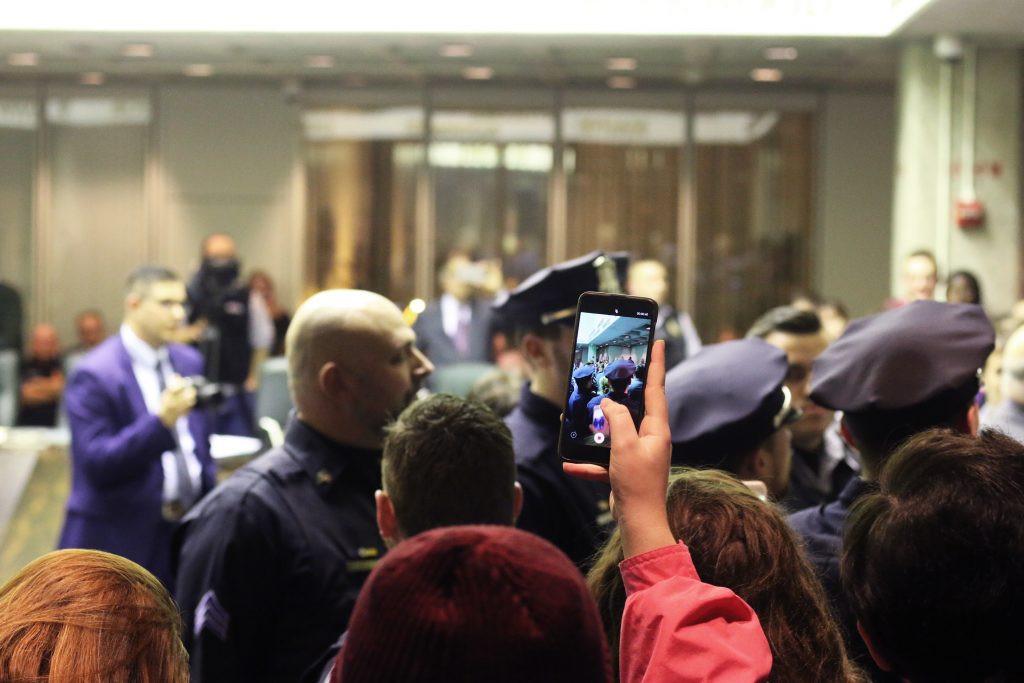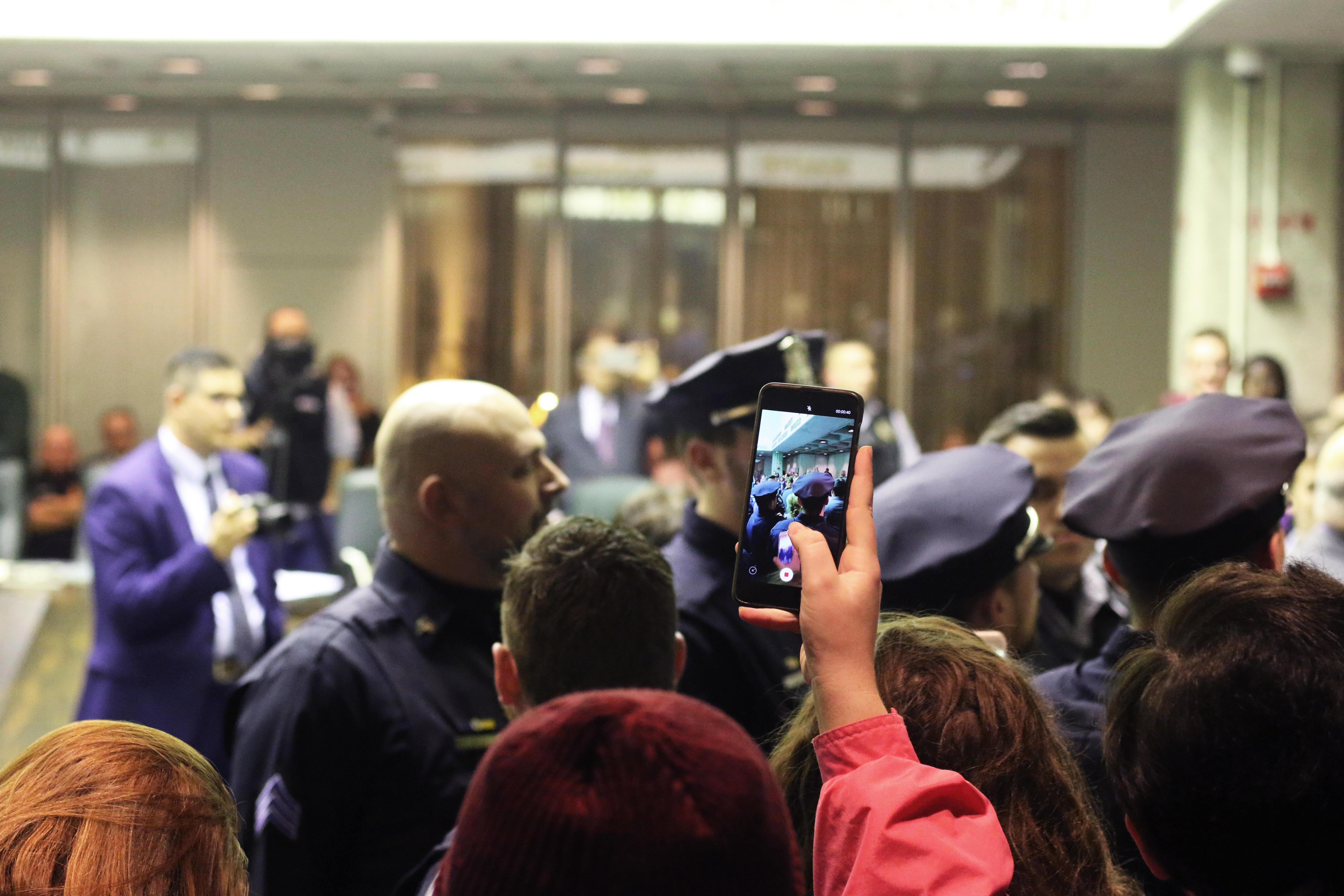Nine arrested during protest over new “annoying an emergency responder” law

Broome County NY November 27 2019
Protests erupted in the Broome County Legislative Chamber on Thursday night as legislators met to vote on a law that would criminalize “annoying, alarming or threaten[ing] the personal safety of any emergency first responder.”
Under the proposed law, violators could face a misdemeanor charge, a year in jail and a $5,000 fine.
At the Broome County Legislature’s meeting, protesters disrupted and put a hold on the proceedings for over an hour, standing in and packing the chamber over capacity. Broome County security, police officers and state troopers were called in, arresting nine for fire code violations and removing others who took the opportunity to criticize the justice system. Several held signs in protest, including one that targeted a physician employed at the Broome County Jail, which has been criticized by several community justice groups for inadequate conditions and medical care. Another sign said “Welcome to Broome County Jail,” with a drawing depicting the grim reaper carrying a scythe.
Lawmakers such as Scott Baker, who introduced and drafted the bill, said the law, titled the “Emergency First Responders Protection Act of 2019,” is meant to protect first responders on the scene of emergencies. However, others, including the New York Civil Liberties Union (NYCLU) said the law would be unconstitutional.
“The proposed law … irreconcilably clashes with the First and 14th Amendments,” the NYCLU said. “It is flatly unconstitutional, has been thrown out in nearly identical iterations by every court to review it and, if it is ever enforced here, will be similarly struck down, perhaps at considerable expense to the county. The NYCLU urges Broome County not to adopt it.”
Several Binghamton University students are also against the proposed law, including Scott Sherman, a senior majoring in philosophy, politics and law. Sherman attended the protest after hearing about the law in question from a professor.
“My professor … told me about this protest,” Sherman said. “He told me they were trying to pass a law that would make annoying the police illegal and punishable by a $5,000 fine, and I find that completely reprehensible. That’s a very dangerous slope toward authoritarianism to me.”
Another vocal opponent of the law and one of those arrested is Andrew Pragacz, a lifelong resident of the area, a Ph.D. candidate in sociology at BU and a visiting assistant professor of sociology and anthropology at SUNY Cortland. Pragacz is also one of the founding members of Justice and Unity for the Southern Tier (JUST), a community organization aimed at fighting against mass incarceration and mass policing.
“It is not illegal to be annoying, and I think there are a lot of things that annoy police officers,” Pragacz said. “What they find annoying is us protesting jail deaths. You can’t criminalize being annoying, because annoying is what it means to protest. This law is a clear attempt to silence the discussion about criminal justice reform and criticizing public officials.”
Prior to the meeting, protesters held up 11 gravestones and read the names and dates of death for each person who recently died while incarcerated at the Broome County Jail, some of whom have lawsuits pending from their families. Upon the official commencement of the meeting, protesters interrupted the legislative proceedings by echoing chants such as, “This is what democracy looks like” and “No justice, no peace.”
Daniel Reynolds, chair of the Broome County Legislature, took to the podium to address his fellow committee members and protesters alike.
“The reason for this legislation was not to oppress anyone in particular,” Reynolds said. “We have been talking about this for a while and one of the reasons it came up was because of firefighters. It was firefighters, paramedics, it wasn’t law enforcement. It isn’t so someone can silence anybody. Constitutional law supersedes anything, so you can’t use this for suppression of First Amendment rights anyway. But protecting our first responders is important.”
Tina Chronopoulos, interim director of the Center of Medieval and Renaissance Studies and an associate professor of classics and Near Eastern studies, raised questions of hypocrisy while connecting the proposed law with the recent campus protests.
“On the one hand, politicians like [state Sen. Fred] Akshar and [Binghamton Mayor] Rich David condemn student protesters on campus for ‘shutting down free speech,’ and yet on the other hand, they fully support this proposed law, which, if passed, will have an impact that is very similar on shutting down free speech,” Chronopoulos wrote in an email. “Namely that folks like those who protested on Indigenous People’s Day, and those who go to protests to bear witness [and] record actions of the police, may now feel a chill and may no longer feel ‘free’ to record these actions when they have every right to do so.”
At the meeting, the legislators unanimously passed a motion to revise the proposed amendment to remove the word “annoy,” deeming it too vague and easily misunderstood. The revised version of the bill will be voted on at the next legislative meeting on Thursday, Dec. 19.




